'I absolutely loved being a World War Two Land Girl'
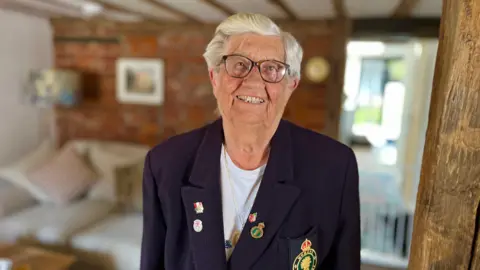 Martin Giles/BBC
Martin Giles/BBCWhen World War Two broke out, many of the men who worked on our farms were called to fight and their jobs were done by the Women's Land Army.
Eileen Webster was just 17 when she signed up.
She will be 100 later this year but still remembers it like it was yesterday.
"My brother was a Royal Marines Commando, the other was a Spitfire mechanic, so I wanted to do something, too," she says.
Eileen, from Sewards End, near Saffron Walden, Essex, was sent to a farm at Takeley, near what is now Stansted Airport, where she lived in a hostel with 16 other girls.
"Growing up with two brothers, I wasn't used to being with a group of girls, but I absolutely loved it," she says.
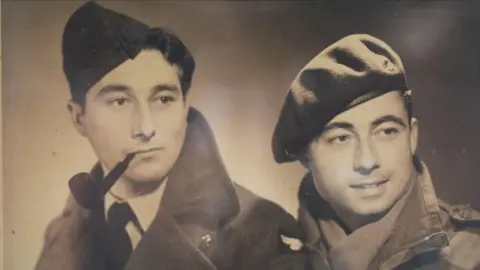 Family Photo
Family PhotoEileen had grown up in the East End of London and left school "with not much of an education" at 14.
"We lived near the River Thames. When the war broke out, nothing really happened for a few months, and then one Saturday we were sitting around the kitchen table and we heard the planes coming up the river. They started bombing us," she remembers.
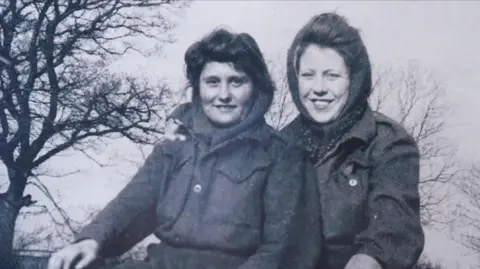 Family Photo
Family PhotoEileen was "Land Girl" for the last three three years of the war, right up to VE Day.
It was sold as a healthy, happy job. In fact, it was tough, dirty and back-breaking work with long days.
The Women's Land Army was established in World War One, but re-founded in June 1939 to provide extra labour.
By the end of the war, more than 80,000 women were working in the fields.
They did a wide range of jobs, including milking cows, lambing, managing poultry, ploughing, gathering crops and carrying out farm maintenance.
Initially they earned £1.85 for a minimum of 50 hours' work a week, which increased to £2.85 in 1944.
"The worst season was the winter. I remember top-and-tailing the sugar beet with a big chopper and my hands were so frozen I was worried I would have an accident," she says.
"That was harsh, but the harvest time was the best. We worked until 10 o'clock at night, but I can't fault it - and I got to drive a tractor," she says.
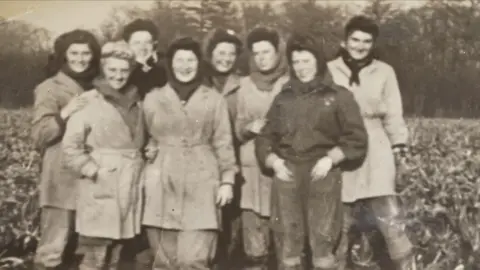 Family Photo
Family PhotoWhile she no longer drives a tractor, Eileen still drives a car, taking hers to the local shops
"I suppose they'll tell me to stop driving one day, but I feel quite safe - I don't go mad," she says.,
She also drives to the village church where she lays a wreath each Remembrance Sunday.
She feels it is important that the duty of remembrance is continued and passed on.
"A lot of people don't care about it now, do they really?" she says.
"Let's face it, it's only us that belong to something that keeps things going.
"They should have more talks in schools. I've spoken in schools about it because we have to remember that if people didn't give their lives it could have gone the other way and we could have been invaded."
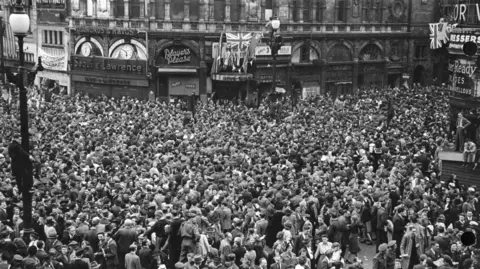
Fortunately, it didn't go the other way. Victory in Europe was announced on 8 May 1945.
There was only one place Eileen wanted to be.
"When we heard the war was over we got on the train and went up to London," she says.
"We were celebrating in Trafalgar Square... Everybody was so happy and cuddling each other and kissing and dancing and singing. It was a really lovely atmosphere.
"I was there all night and I fell asleep in the entrance to a cinema. I had my photo taken by a reporter from the Daily Herald."
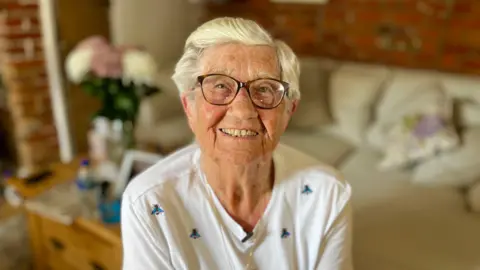 Martin Giles/BBC
Martin Giles/BBCEileen loved her wartime years in rural Essex so much that she moved there in the 1970s, settling in a village just a few miles from the fields where she spent her late teens.
"The house where we stayed is still there. It's called The Limes and there were 16 Land Army girls in there, with two ladies looking after us.
"Sometimes when I'm out that way I stop and look up at the house and remember that bunk bed where I used to sleep. It was such a happy time."
Follow Essex news on BBC Sounds, Facebook, Instagram and X.
